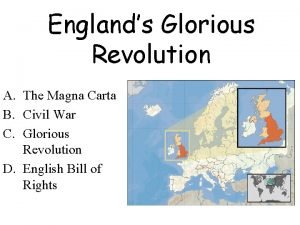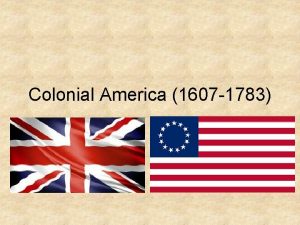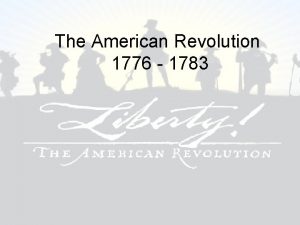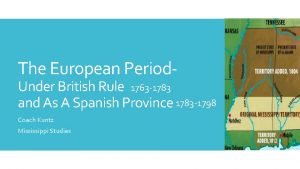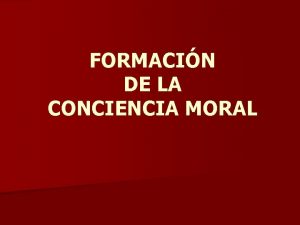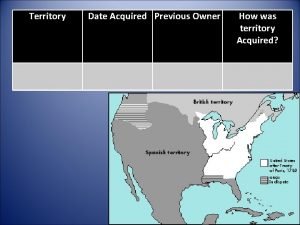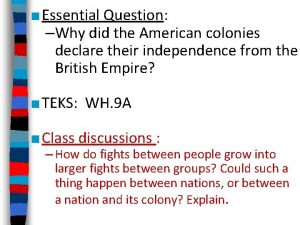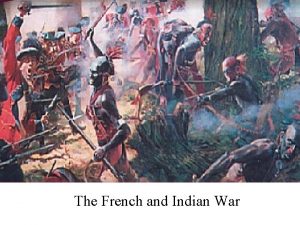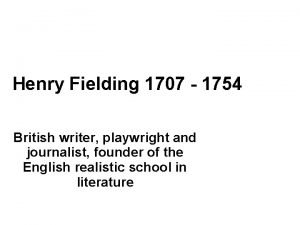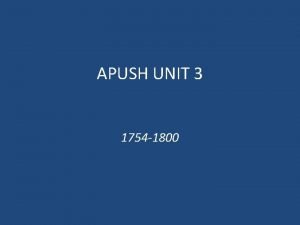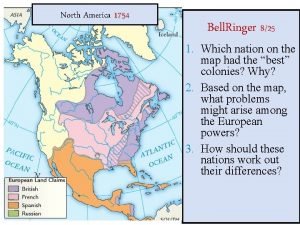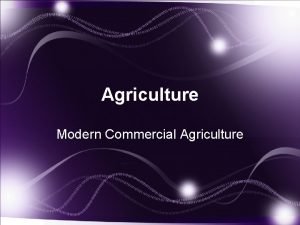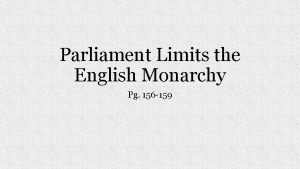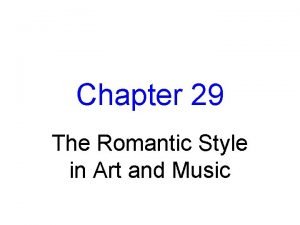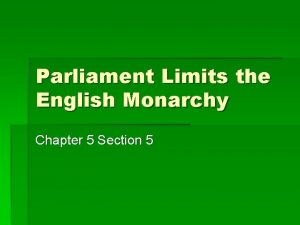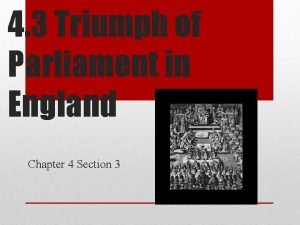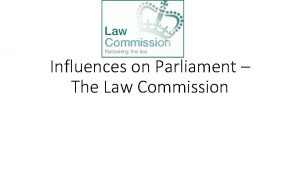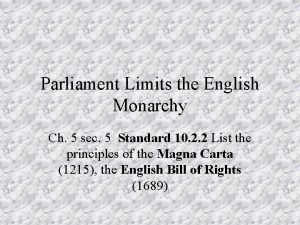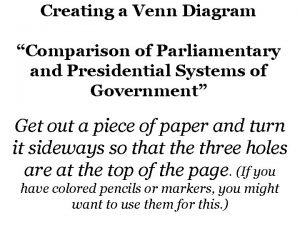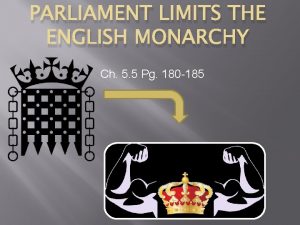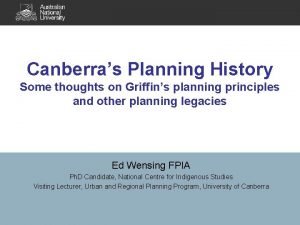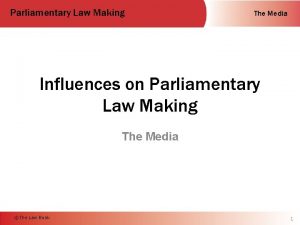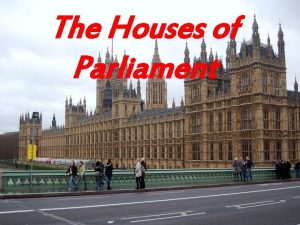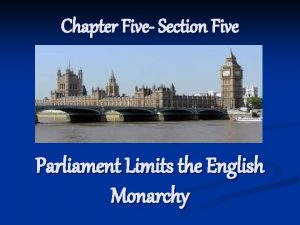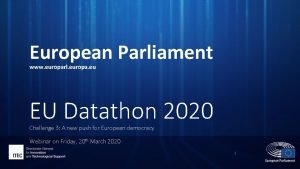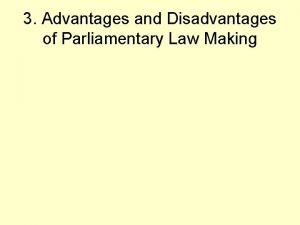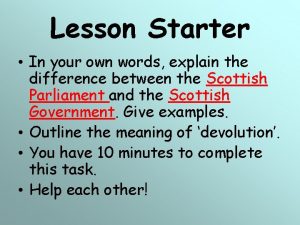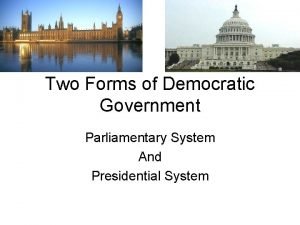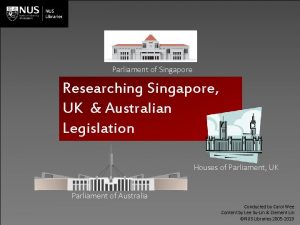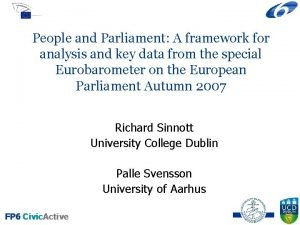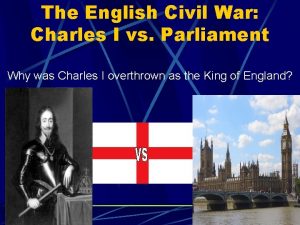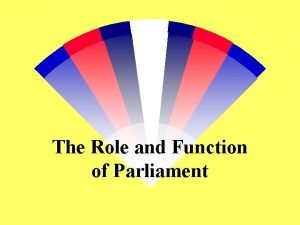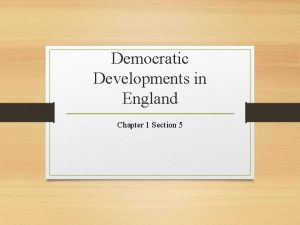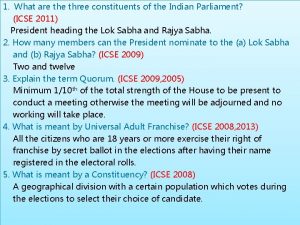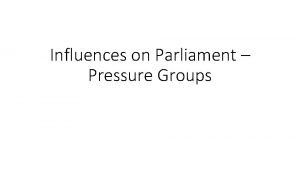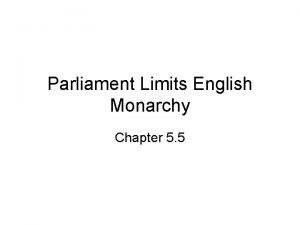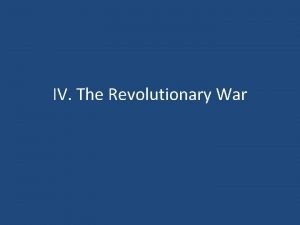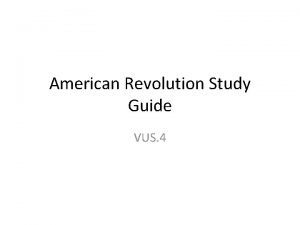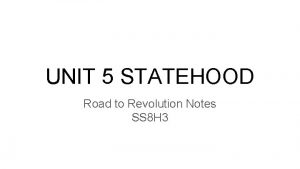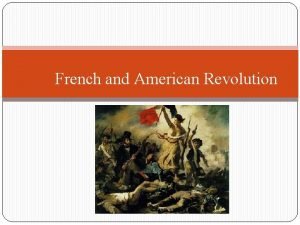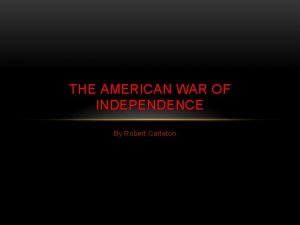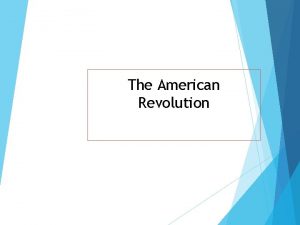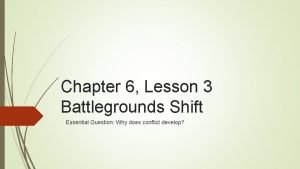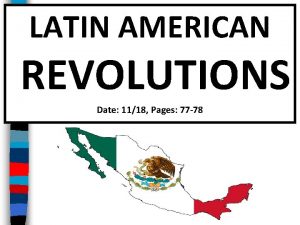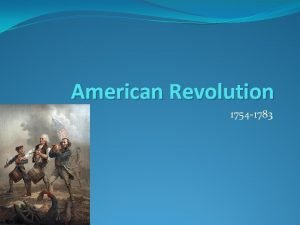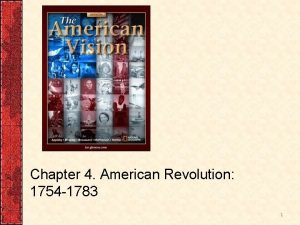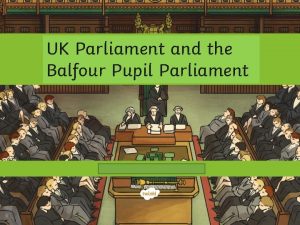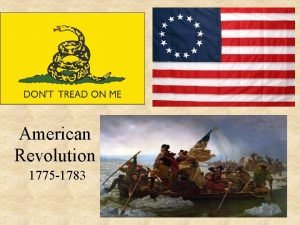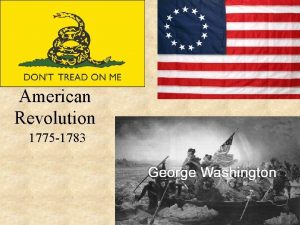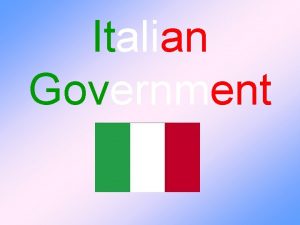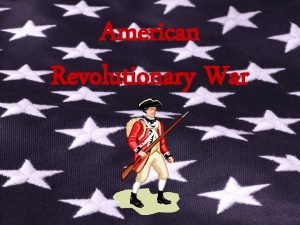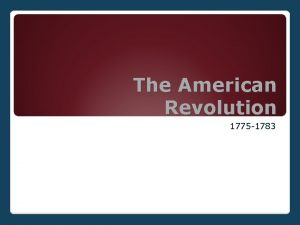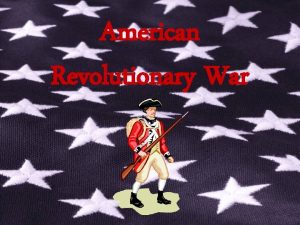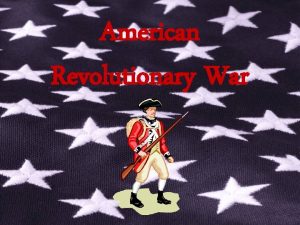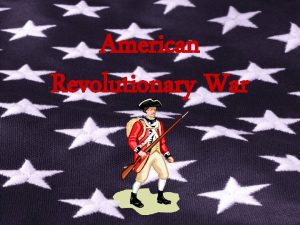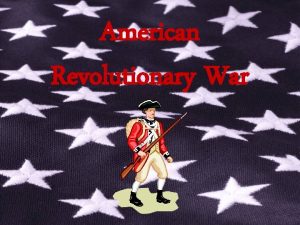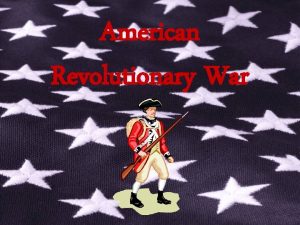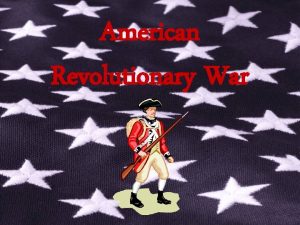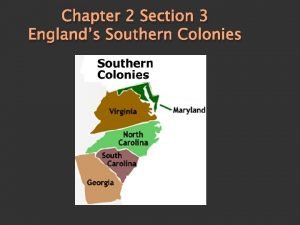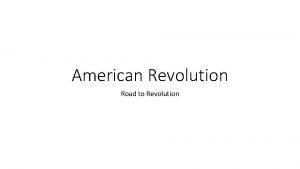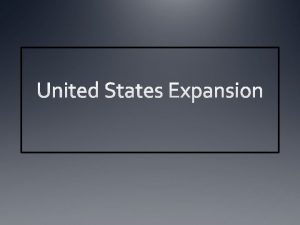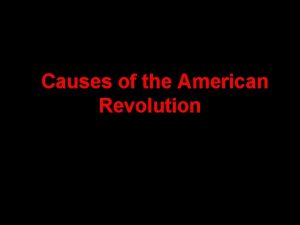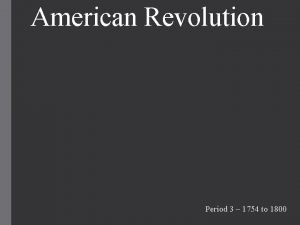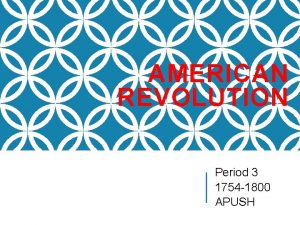The American Revolution 1754 1783 Parliament Englands legislative




















































- Slides: 52

The American Revolution 1754 -1783 Parliament (England’s legislative or lawmaking body) and the King did not always understand what the colonists needed, therefore; the colonists became very good at self-government and as they got better at it, they needed less interference from the British government.

I. Colonialism and Mercantilism a. European countries established colonies to make themselves richer and more powerful. One way to do this was through mercantilism. b. Mercantilism: Nations sought to acquire more gold and silver and to control trade so that the mother country exported more goods than it imported. 1. If the value of exports is higher than the value of imports, the mother country becomes richer.

c. Great Britain used the colonies as sources of raw materials and as markets for finished goods. Example: The colonies would grow cotton as a raw material, then send it to England would then manufacture the cotton in a textile millmake it into cloth, and sell it back to the colonies.

d. British gov’t encouraged the development of new products 1. Paid subsidies (extra payment) for it e. GB developed the ‘enumerated’ listgoods that could only be sold to England 1. Indigo and rice were on this list 2. GB never enforced on the rice

II. The French and British Rivalry A. France and England were rivals economically and politically. B. Both France and England practiced mercantilism 1. Prevented their colonies from trading with anyone else

III. The French and Indian War 1754 -1763 a. Named because England was fighting France and France’s Indian allies b. Started when France moved into the Ohio River Valley 1. Belonged to England 2. Leads to Cherokee War in SC.

IV. Cherokee War A. Conditions for war start when English settlers move into backcountry.

B. Fighting lasted about two years with many Cherokee deaths. C. Treaty ending the war created a boundary between the colony and the Cherokee.

V. Results of French and Indian War A. French and Indian War ended with a British victory 1. Spain lost Florida 2. Indigo trade expanded 3. Both good for SC b/c they got more money!$! B. This war caused great Britain to have a BIG DEBT C. To pay it back, they decided to get it from

Outcome of the French and Indian War: How did it help South Carolina? Spain lost Florida to Great Britain Gave South Carolina settlers more land to move too without fear of Spanish attacks Expansion (growth) of Indigo Trade The British could no longer get the crop from the French West Indies colonies, so they turned to South Carolina for the crop. Helped South Carolina’s economy.


d. They did this by establishing ACTS, a law or tax enforced by the British on the American colonists 1. Stamp Act 2. Townshend Acts 3. Tea Act 4. Intolerable Acts

VI. Stamp Act, 1765 a) This act placed a tax on all paper items which the colonists paid directly. b) Paper items included: 1. Legal documents 2. Newspapers

VII. ‘Taxation without Representation’ a) Colonists did not have their own representation in Parliament, their rights were not being protected b) Colonists wanted their own colonial assemblies to impose taxes. c) Colonists organized a Stamp Act Congressboycotted all English goods until the Act was repealed.

VIII. Townshend Acts, 1767 a) Act placed a tax on all glass, paint, lead, paper, and tea brought to the colonies. b) Colonists boycotted all British goods and attacked merchants who tried to sell these goods.

IX. Tea Act, 1773 a) Monopoly – when only one company can sell something b) This act did not raise taxes on teas, but it did give a monopoly on tea sales to the East India Tea Company.

c) The colonists could only buy tea from them. d) This did force the colonists to pay the tax on tea that was included in the Townshend Act.

X. Sons of Liberty a) The Sons of Liberty were a secret group of men opposed to the British Acts. b) It was the Sons of Liberty that organized resistance to the British laws beginning with the Stamp Act.

XI. Response to Tea Act a) Lead by the Sons of Liberty, the colonists refused to allow any ship from the East India Tea Co. to land in colonial harbors. b) Boston, Sons of Liberty dressed as Indians and dumped the tea from the ships into the harbor. Became known as the Boston Tea Party c) ‘tea parties’ began in other colonies including Charlestown, South Carolina.


XII. Intolerable Acts, 1774 a) Acts passed by parliament as punishment for the Boston Tea Party b) Colonist sent delegates to a Continental Congress in order to solve the problem

c) Christopher Gadsden and Edward Rutledge were elected as delegates for South Carolina in the First Continental Congress.

XIII. First Continental Congress a) The Congress established a nonimportation and non-exportation agreement. 1) The colonies decided to not buy or sell any goods from England b) However, South Carolina was allowed to trade in rice, since rice was essential to the survival of the colony.

c) This agreement was made to get England to repeal the Intolerable Acts.

d) They also approved measures to defend themselves should Great Britain declare war. e) Even though most of the colonies wanted to remain a part of the British Empire, they readied their militias.

XIV. SIDES a. Loyalist: Colonists that did not want a war and were loyal to Great Britain. Tended to live in the Upcountry or worked for the British government. b. Patriot: Colonists that wanted independence from Great Britain. Tended to be plantation owners and wealthy merchants that were directly affected by the taxes. c. Neutralist: Colonists that were not any side. Tended to be immigrants from countries other than England.


XV. April 1775 a. Battle of Lexington and Concord 1. British soldiers march to Lexington to destroy the colonists’ weapon supply. 2. Paul Revere and Sam Dawes were sent to warn the colonists “The British are Coming!”

c. When the British Army arrived, the colonists are waiting but are ordered to leave. d. As the colonists are leaving, a shot rang out 1. This is “The Shot Heard ‘Round the World”. 2. This was the start of the American Revolution

XVI. May 10, 1775 a. Second Continental Congress 1. Colonial delegates met for a second time in Philadelphia to try and make peace with Great Britain. 2. They also establish a Continental Army under the command of George Washington.


XVII. Civil War in South Carolina a. Conflict between the loyalists and patriots 1. Most patriots lived in the Lowcountry while loyalists tended to live in the upcountry.

2. South Carolina and New York had the more loyalists than other colonies 3. At least 137 skirmishes (fighting between small groups) took place in South Carolina during the American Revolution.

XVIII. Early 1776 a. King George III had declared the colonies in rebellion. b. Hired German mercenaries (soldiers who fight for anyone who pays them) to bring the colonists under control. c. It would only be a matter of time before the colonies declared

XIX. June 28, 1776 a. American forces at Fort Moultrie successfully defend Charleston against a British naval attack b. The fort was made of Palmetto trees that made the fort strong and could withhold cannonballs.

Fort Moultrie

XX. July 4, 1776 a. The Declaration of Independence is approved 1. Defines the reasons why the colonists were declaring their independence from England. 2. Outlines the grievances against the king of England.

XXI. South Carolina’s Involvement a. There were four South Carolinians who signed the Declaration of Independence 1. Edward Rutledge 2. Thomas Lynch Jr. 3. Thomas Heyward 4. Arthur Middleton b. None of the South Carolina signers were eager for independence

XXII. 1778 a. France recognizes the United States and said will help supply Washington’s army b. France officially declares war against Britain

1. June 28, 1776 XXIII. Late 1779 a. British General Clinton sets sail from New York with 8000 men for Charleston, SC.

XXIV. April 8, 1780 a. The British attack begins against Charlestown as warships sail past the cannons of Fort Moultrie and enter Charleston harbor. b. Washington sends reinforcements

XXV. May 12, 1780 a. The worst American defeat of the Revolutionary War occurs as the British capture Charleston and its 5400 man garrison (the entire southern American army)

XXVI. May 1780 a. After the British captured Charleston, they attempted to conquer the whole state. b. The Continental Congress chose Horatio Gates to lead reinforcements into Charleston c. Gates marched straight into Camden an important British outpost

XXVII. Battle of Camden a. Many of Gates men were untrained militia and panicked, leaving Gates to be defeated b. British are on the brink of controlling all of South Carolina

XVIII. Rise of South Carolina Partisans a. Partisan- Patriots who fought guerilla warfare (hit and run tactics) against the British Army. b. As the British try to control South Carolina, they treat the colonists harshly. 1. Burning churches, looting or confiscating homes, and harassing and mistreating citizens

c. This harsh treatment turned many South Carolinians against the British and they formed partisan bands, such as: 1. Thomas Sumter 2. Francis Marion 3. Andrew Pickens

XXIX. Thomas Sumter a. The British burned his home and he responded by rallying backcountry men into a Partisan fighting force. b. Sumter’s forces attacked British supply lines and loyalist forces in the Upcountry, giving hope to the Patriot cause. c. Earned the name the “Gamecock” for his actions

XXX. Francis Marion a. Began a partisan band along the northeast coast of South Carolina. b. Marion and his forces launched surprise attacks on the British and then disappeared into the Lowcountry swamps earning him the nickname t the “Swamp Fox. ”

XXXI. Andrew Pickens a. Used guerilla warfare against the British in the Upcountry b. Was given the name the “Wizard Owl” by Native Americans.

XXXII. Battle of King’s Mountain a. Partisans defeat mixed force of British regulars and loyalist militia b. Major upset for the British by the Americans c. Turning point in the war in South Carolina

XXXIII. Battle of Cowpens. 1781 a. An American Victory at Cowpens, South Carolina b. General Daniel Morgan defeats British General “Bloody” Tarleton c. The British are kicked out of SC and retreat to Yorktown, VA.

XXXIV. The End of the War a. January 1782 1. The British and Loyalists begin leaving America b. September 3, 1783 1. The Treaty of Paris is signed-officially ending the Revolutionary War
 Englands glorious revolution
Englands glorious revolution What are two non legislative powers given to congress
What are two non legislative powers given to congress How could the french revolution have been avoided
How could the french revolution have been avoided Catecismo de la iglesia 1783
Catecismo de la iglesia 1783 1783-1607
1783-1607 Us in 1783
Us in 1783 Under british rule, 1763-1783
Under british rule, 1763-1783 Catecismo de la iglesia 1783
Catecismo de la iglesia 1783 Treaty of paris 1783 apush
Treaty of paris 1783 apush Oregon territory previous owner
Oregon territory previous owner Us in 1783
Us in 1783 French territory in north america 1754
French territory in north america 1754 1754 lulu love
1754 lulu love 1754 to 1800 apush
1754 to 1800 apush North america 1754 map worksheet answer key
North america 1754 map worksheet answer key Third agricultural revolution definition
Third agricultural revolution definition Russian revolution vs french revolution
Russian revolution vs french revolution Parliament limits the english monarchy
Parliament limits the english monarchy Houses of parliament architecture style
Houses of parliament architecture style Parliament limits the english monarchy
Parliament limits the english monarchy Lesson 3 triumph of parliament in england
Lesson 3 triumph of parliament in england Write a note on frankfurt parliament
Write a note on frankfurt parliament Law commission influence on parliament
Law commission influence on parliament Parliament limits the english monarchy
Parliament limits the english monarchy Parliamentary vs presidential venn diagram
Parliamentary vs presidential venn diagram Parliament limits the english monarchy
Parliament limits the english monarchy Parliament house
Parliament house How does the media influence parliamentary law making
How does the media influence parliamentary law making The british parliament sits in
The british parliament sits in European parliament committee on legal affairs
European parliament committee on legal affairs Parliament limits the english monarchy answer key
Parliament limits the english monarchy answer key Eu datathon
Eu datathon Advantages of acts of parliament
Advantages of acts of parliament Founding principles of the scottish parliament
Founding principles of the scottish parliament Presidential form of government
Presidential form of government Parliament
Parliament European parliament voter turnout
European parliament voter turnout Charles 1 vs parliament
Charles 1 vs parliament Role of parliament
Role of parliament How did parliament emerged victorious in medieval england
How did parliament emerged victorious in medieval england What are the three constituents of the indian parliament
What are the three constituents of the indian parliament Influences on parliament
Influences on parliament Frankfurt parliament
Frankfurt parliament Chapter 5 section 5 parliament limits the english monarchy
Chapter 5 section 5 parliament limits the english monarchy Disadvantages of media influence on parliament
Disadvantages of media influence on parliament Continental army strengths and weaknesses
Continental army strengths and weaknesses American revolution study guide answer key
American revolution study guide answer key Road to revolution cloze notes 1
Road to revolution cloze notes 1 Outcome of french revolution
Outcome of french revolution American revolution facts
American revolution facts Scopes monkey trial apush definition
Scopes monkey trial apush definition Lesson 3 battlegrounds shift
Lesson 3 battlegrounds shift Latin american revolution date
Latin american revolution date
